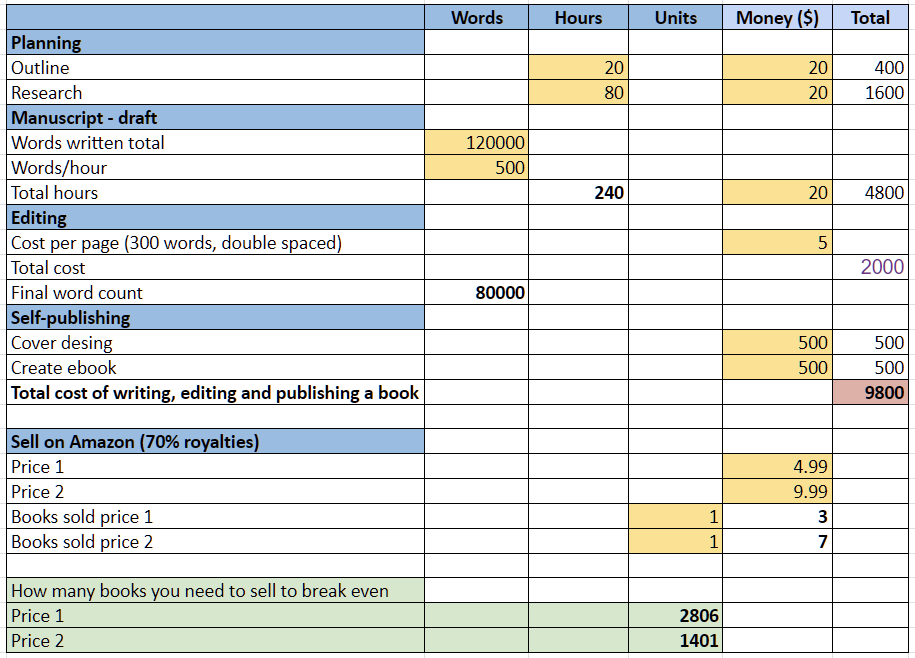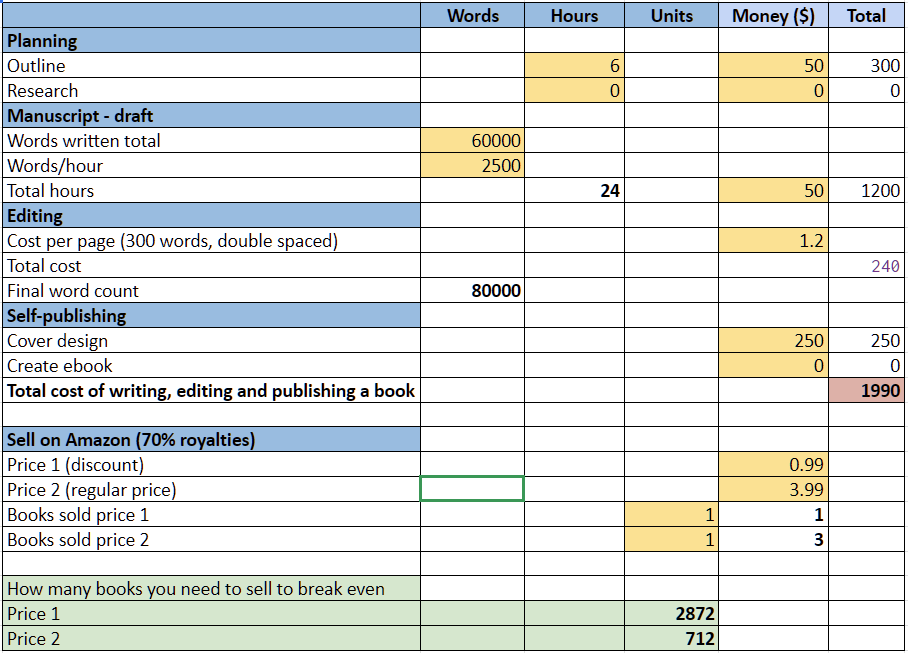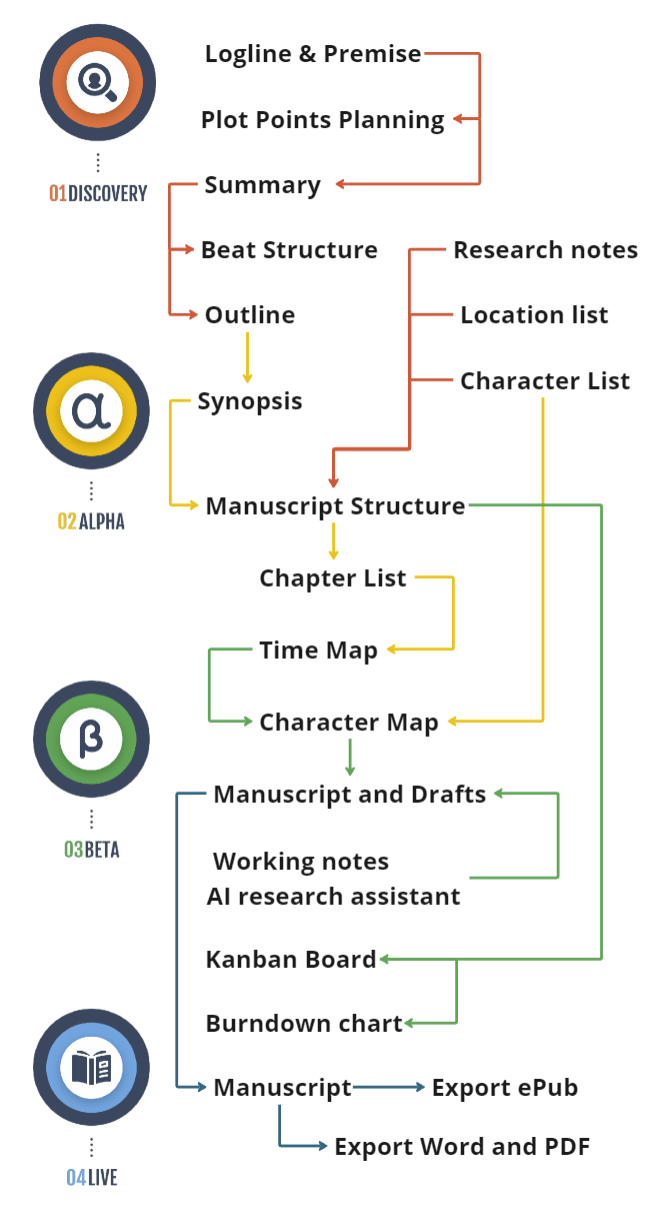Once you decide you want to publish and sell your books, makes sense to think about you as a business. Your personal brand is your company brand and the books you sell are your products.
If your goal as a writer is not to sell your books that’s fine. Nothing interesting for you to read here. What I will talk next is one of the aspects that define when you become a professional writer. The main aspects in defining a professional writer are:
- Conduct – behaving like a professional that understand the work hours need to be put in and the advancement of the writing community benefits the individual.
- Product – the book is professionally written, had gone through the Caudine Forks of an editor, and has a well-designed cover.
- Sales – Break-even point and profit.
And you guessed: point number 3 it is!
One of the first question I receive when I talk with business people about project management tools for writers and about all the money and work hours that go into building Asengana is: “What’s your break-even point?”
I applied the same type of answer for the process of writing, publishing, and selling a book. It will be a back-of-the-envelope type calculation, but I’ll provide you with a document and you can add as many variables as you need.
First, I defined the phases: Planning, Writing, Editing, Creating the product/book, and Selling. The goal is to see how much money and work-hours takes to have a book ready and how many sold books it takes to get to a break-even point when your costs are covered and you make a profit.
- Planning—this step was interesting because most writers don’t think about their planning in terms of how many hours it takes. And you should…
- Writing—again, not one of those activities you think as paid work-hours. The assumptions I used was $20/hour (the equivalent of a monthly salary of about $3400). While there are days when you write fast, the real average for the entire duration of writing a book is 500 words/hour or less.
- Editing, Cover design, and e-Book creation are usually outsourced activities. You pay other professionals to do it. Even good editors hire another editors for their own books. I considered an average of 4-5 pages/hour. I’ll detailed a discussion I had about editorial services in another article.
- Book sales—here I used only one platform, Amazon, with two prices that qualify for 70% royalties.
Again, you can use different values, but here are some insights:
When you quantify the price of the work (hours) you put into writing a book, the price of editing doesn’t seem so high anymore.
When you perceive yourself as a professional and understand the value of your work, you understand and respect the work of other professionals: editors, graphic-designers.
If 2000 books sold is a good number than a well-written book made by professionals deserves a fair price which must be more than $9.

Download this file, do your own calculations to know that he moment when your books sells are covering your costs.
The moment when you make a profit and use the money as part of sustaining your livelihood is when you become a professional writer.
Later edit:
I’ve got another estimate from my friend Kevin McLauglhin (he knows a lot more about book covers than me)

Below you have his rationale for this:
Kevin McLaughlin “This is a good breakdown. Too often, authors forget to take into account all the myriad costs associated with publishing AND writing. Time sunk into a project is probably the #1 thing people forget to account for.
That said, I question some of the numbers used! I can see writing an outline requiring as much as 20 hours for a novice writer; but an experienced author will tend to do that job in much, much less.
Likewise, 80 hours for research? For a highly technical nonfiction book, probably. Not for fiction. (There are some spots of fiction which do require research, but people writing in them usually also READ about those things as a hobby, and have prior knowledge before starting the book.)
The 500 WPH count is the low end of the spectrum. I average 2500 words per hour; I’m on the high end, but nowhere near the top (top speed authors average 5-6k per hour via dictation). My observation is the average seems to start at about 1000 WPH and eventually rise with experience to 1500-2500 (or more, via dictation).
This is important, because word throughput (while retaining quality, a key!) is one of the primary ways we can increase efficiency in the process, reduce costs, and increase number of books released per year. More books = more revenue.
A $500 cover isn’t the absolute highest, but it’s very possible to get a professional cover for $150-300. That’s the normal range. A $500 cover means you’ve hired one of the best in the business, something which should probably be reserved for AFTER your books are already making you good money.
Creating the ebook is free. If you’re using Vellum there is a one-time sunk cost; after that it’s whatever 10 minutes of your time is worth. If you’re using Draft2Digital or similar software, it’s free, but still costs that ten minutes. Seriously; anyone who is still paying someone for a process that’s about as complex as exporting a PDF from MS Word needs to go learn how to do this themselves.
Also worth noting that most copy editors are charging half a penny to a penny a word. The $2000 figure is probably accurate for someone who has a content edit first, followed by a line or copy edit. That’s again a cost that novice writers have which goes away after enough practice.
I wonder about setting the salary so low, as well. I would generally value my time higher than that. Working as a nurse I made $30/hr plus benefits. I didn’t switch to writing full time until I was effectively making more than that as a writer.”



